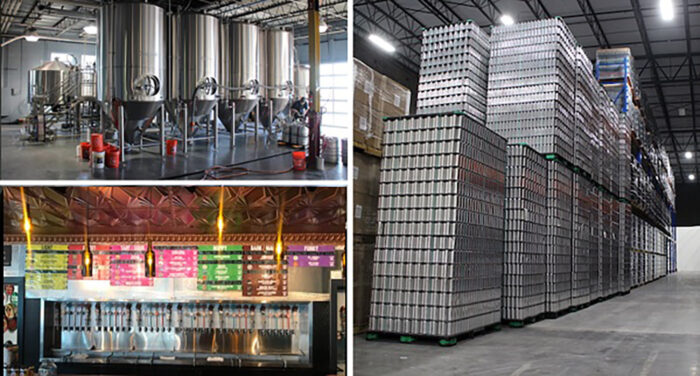
The legislation would allow breweries to sell their product directly to retailers and restaurants. (BizSense file photo)
Now that the General Assembly session is over, it looks like it’ll be a matter of when, not if, Virginia breweries are able to self-distribute their beer.
The Beer Industry Limited Distribution Act, a bill that would clear the way for Virginia breweries to sell a limited amount of their beer directly to retailers and restaurants annually, is headed to the desk of Gov. Glenn Youngkin to be signed into law.
Under Virginia’s existing “three-tier system,” breweries have to first sign with a distribution company, which then sells the beers to retailers and restaurants.
The new bill, House Bill 2258, would create the Virginia Beer Distribution Co., which would be the legal mechanism through which breweries could self-distribute up to 500 barrels (about 1,400 kegs) of their beer each year. The VBDC would be a division within the state’s Department of Agriculture and Consumer Services.
After passing muster in subcommittees early in the General Assembly session, the bill, patroned by Del. Roxann Robinson (R-Chesterfield), went on to be passed by both the House of Delegates and Senate in recent weeks.
The start-up costs for the VBDC total around $750,000, money that would come from the state budget that’s still being hashed out by the Youngkin administration and the General Assembly.
With the full state budget still up in the air, the Beer Industry Limited Distribution Act includes a delayed enactment clause to allow it to go into effect in 2024, as a hedge against it possibly not receiving funding this year. If funded this year and signed into law by Youngkin, the bill could go into effect this summer.
The bill was supported by both the Virginia Craft Brewers Guild and the Virginia Beer Wholesalers Association, the same trade associations that first began working on the bill last year. Phil Boykin, President and CEO of the VBWA, said he’s glad that the bill made it through the House and Senate.
“We’re excited to see the bill heading to the governor’s desk for his consideration,” Boykin said. “Having worked closely with the administration on it throughout the legislative process, (we) are optimistic about it becoming law.”
VCBG President and CEO Brett Vassey said the bill would open up new markets for over 300 craft breweries in Virginia.
“The passage of (the) Beer Industry Limited Distribution Act is historic and we are anxiously awaiting the budget conferee’s decision to fund the Virginia Beer Distribution Company,” Vassey said in an email.
The VBDC is modeled after the Virginia Wine Distribution Co., which was created in 2007 to allow Virginia wineries to self-distribute.
Ryan Mitchell, who owns Carytown’s Garden Grove Brewing and Urban Winery, has already had a taste of self-distribution through the VWDC and is excited that he may soon be able to sell his beer directly to restaurants and retailers.
“Right now we’re allowed to take our honey wine or wines and sell them to a restaurant like Heritage and build that relationship,” Mitchell said. “Self-distribution really helps facilitate better relationships with breweries and restaurants.”
He said he thinks self-distribution might also allow breweries to try to sell more of their niche products, rather than the beers that they think the distributor would be able to sell.
“But on the flip side of that, the distribution company has established relationships all over Virginia. So for some breweries that want to get outside of their territory, the cost is going to be higher because they’ll have to hire a salesperson,” Mitchell said.
The bill would also close a loophole for breweries to create “arms-length” distribution companies. It’s currently illegal for brewery owners to also own a distribution company, but their spouses or family members could. The Beer Industry Limited Distribution Act would grandfather in existing arms-length distributors but preclude the creation of new ones.

The legislation would allow breweries to sell their product directly to retailers and restaurants. (BizSense file photo)
Now that the General Assembly session is over, it looks like it’ll be a matter of when, not if, Virginia breweries are able to self-distribute their beer.
The Beer Industry Limited Distribution Act, a bill that would clear the way for Virginia breweries to sell a limited amount of their beer directly to retailers and restaurants annually, is headed to the desk of Gov. Glenn Youngkin to be signed into law.
Under Virginia’s existing “three-tier system,” breweries have to first sign with a distribution company, which then sells the beers to retailers and restaurants.
The new bill, House Bill 2258, would create the Virginia Beer Distribution Co., which would be the legal mechanism through which breweries could self-distribute up to 500 barrels (about 1,400 kegs) of their beer each year. The VBDC would be a division within the state’s Department of Agriculture and Consumer Services.
After passing muster in subcommittees early in the General Assembly session, the bill, patroned by Del. Roxann Robinson (R-Chesterfield), went on to be passed by both the House of Delegates and Senate in recent weeks.
The start-up costs for the VBDC total around $750,000, money that would come from the state budget that’s still being hashed out by the Youngkin administration and the General Assembly.
With the full state budget still up in the air, the Beer Industry Limited Distribution Act includes a delayed enactment clause to allow it to go into effect in 2024, as a hedge against it possibly not receiving funding this year. If funded this year and signed into law by Youngkin, the bill could go into effect this summer.
The bill was supported by both the Virginia Craft Brewers Guild and the Virginia Beer Wholesalers Association, the same trade associations that first began working on the bill last year. Phil Boykin, President and CEO of the VBWA, said he’s glad that the bill made it through the House and Senate.
“We’re excited to see the bill heading to the governor’s desk for his consideration,” Boykin said. “Having worked closely with the administration on it throughout the legislative process, (we) are optimistic about it becoming law.”
VCBG President and CEO Brett Vassey said the bill would open up new markets for over 300 craft breweries in Virginia.
“The passage of (the) Beer Industry Limited Distribution Act is historic and we are anxiously awaiting the budget conferee’s decision to fund the Virginia Beer Distribution Company,” Vassey said in an email.
The VBDC is modeled after the Virginia Wine Distribution Co., which was created in 2007 to allow Virginia wineries to self-distribute.
Ryan Mitchell, who owns Carytown’s Garden Grove Brewing and Urban Winery, has already had a taste of self-distribution through the VWDC and is excited that he may soon be able to sell his beer directly to restaurants and retailers.
“Right now we’re allowed to take our honey wine or wines and sell them to a restaurant like Heritage and build that relationship,” Mitchell said. “Self-distribution really helps facilitate better relationships with breweries and restaurants.”
He said he thinks self-distribution might also allow breweries to try to sell more of their niche products, rather than the beers that they think the distributor would be able to sell.
“But on the flip side of that, the distribution company has established relationships all over Virginia. So for some breweries that want to get outside of their territory, the cost is going to be higher because they’ll have to hire a salesperson,” Mitchell said.
The bill would also close a loophole for breweries to create “arms-length” distribution companies. It’s currently illegal for brewery owners to also own a distribution company, but their spouses or family members could. The Beer Industry Limited Distribution Act would grandfather in existing arms-length distributors but preclude the creation of new ones.


Will the VBDC own vehicles for distribution logistics? If so, how is this different than going through Brown or Premium? If not, how will the product be delivered? From a small retail store perspective, adding ONE new vendor for 5-8 local beers is no worry, but managing 5-8 new vendors, drivers, and their cooler shelf “real estate” might be a challenge. Brown and Premium drivers do a fairly good job of managing their sections of the coolers…..
Agree J. Sid. In addition to all the items you mention impacting small business, the retailers do not want 10 more invoices to manage either. But I was thinking from a small winery and craft beer maker. The costs of distribution are very high for an individual location. This is the reason distributors are popular and economical for small wineries and craft beer makers. The article mentions a Ryan – but I can’t imagine how Ryan is going to grow his business by hiring his own delivery drivers. Ryan may increase profits and customer awareness, but increased payroll, truck fleet,… Read more »
Look at it from a restaurant perspective: If I want a certain tomato or cut of meat, I use a certain vendor. The folks who will really benefit from this bill are the 2nd and 3rd tier brewers with a limited inventory. Previously, the only way to get it out of the tasting room was to utilize a distributor monopoly (Brown, Loveland, etc).
Correct. “Sales” is not just having a bar or store buy product. And transportation costs MORE per hour or per mile if there is less scale on which to distribute fixed costs.
And for the down-voters: feel free to explain how there will be savings in the cost structure of multiple small fleets of vehicles, drivers, and salespeople…..asking for a friend….
Breweries have 2 choices: Rely on their taproom or explore outside sales. No matter the scale, if you want to grow your business, you expand your consumer base. Let’s say I’m running “Bob’s Brewing.” A distributor isn’t going to pick up my product if I’m only running a few dozen kegs or cases per week. They want scale. So I’m stuck with my taproom. Under this bill, I can invest in a single truck, start knocking on doors, and put my beer in a couple of restaurants and markets. This will, in turn, attract more folks to my taproom, which… Read more »
It would depend on the store, wouldn’t it? Your local 7-11 or WaWa has a company commissary and trucks, and those deliver all product. If you’re a local market (like Stella’s Grocery) you likely have multiple vendors to get the specialized products that you want.
Incorrect. Brown and Premium deliver directly to 7-Eleven and WaWa stores, just as they do with small independent stores/restaurants or large grocery stores.
Monopolies are terrible, no matter how convenient they may make your life. This is a truth we all need to embrace.
What are you talking about? The stores want it, the breweries want it, and NO ONE benefits from middlemen controlling the flow of goods and services.
Care dealers, marijuana dispensaries are all kept in place.
I was wrong, these monopolies do benefit one set of people-the middlemen at the expense of everyone else.
As ususal in the BizSense comments, the armchair QBs 1) think that a question in the comments is an affront to the article or is necessarily choosing sides, and 2) assume they can ‘intuitively’ understand all aspect(s) of business even though they have no experience with a particular industry. #2 is an obvious trait in all but one comment above. Transportation is not as simple as “buy a truck and hire a driver”. If you want to be sure you have truck/driver for the Friday route, you need TWO trucks/drivers in case of illness/vacation or breakdown/P.M. And the payroll, depreciation,… Read more »
Amen brother – preach on!
You are correct in your comment above that Brown et al deliver to 7-11. My point remains, if you run a franchise store/restaurant, you likely have a main commissary that delivers 90% of your product. If you’re an independent, you likely have multiple vendors. As far as my expertise as an “armchair QB,” I’ve run restaurants, ran a brewery, worked for a food distributor, and managed a retail shop. I spent the better part of 40 years dealing with Virginia’s archaic and monopolized liquor laws.
But what do I know…
Apparently: not so much. C-Stores aren’t franchised, and what franchised restaurant sells local beer? Also: there is no “commissary” system for beer other than Brown/Premium – why would a business do that when Brown/Premium have a huge fleet of drivers/vehicles and will deliver directly to the smallest vendor? Irrespective, even though the VAABC system may need lots of improvement and this bill may appear to be beneficial to small brewers, the cost of transportation on a small scale is extremely high. None of the experience listed above demonstrates knowledge or understanding of transportation cost accounting.
7-11 offers franchise opportunities. As a general manager for Applebee’s (part of the Apple South franchise group) I sold local craft beers. When I reference “commissary,” I’m speaking of food & dry goods. Brown et al have a huge fleet of trucks/drivers because they have a virtual monopoly over beer distribution. Brewers large & small pay a fee to the distributor to get their products to consumers. If the distributor decides that you’re too small, you aren’t getting picked up. Part of my job working for a food distributor was scheduling/routing trucks and drivers.